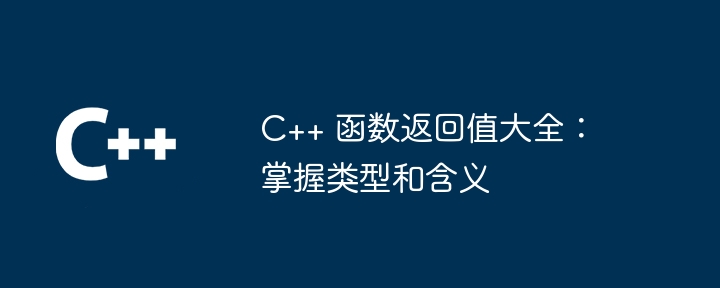
The return value type of the C function defines the operation result after the function is executed. Basic types include void (returns no value), bool (true or false), and numeric types (integer and floating point). Pointer types point to objects or dynamically allocated memory. Reference types provide direct access to original variables. Practical case: The maximum value calculation function returns the maximum value of two integers, and the dynamic memory allocation function returns a pointer to the allocated space.

C Complete collection of function return values: Master the types and meanings
The function return value is an important part of the function and indicates the function The result of the operation after execution. There are various return value types defined in C, each type represents a different meaning และข้อมูล type.
Basic type
void: means the function does not return any value.
void greet() {
std::cout << "Hello world!" << std::endl;
}Boolean type (bool): Represents true (true) or false (false).
bool isEven(int number) {
return (number % 2 == 0);
}Numeric types: Including integer types (int, long, short) and floating point types (float, double, long double).
int sum(int a, int b) {
return a + b;
}Pointer type
Pointer to an object or dynamically allocated memory: Storage object or allocated memory address.
std::string* createString() {
return new std::string("Hello");
}Reference type
Reference to a variable: Provides direct access to the original variable access.
int& getMax(int& a, int& b) {
if (a > b) {
return a;
} else {
return b;
}
}Integer type
Floating point type
Practical case
Maximum value calculation:
int getMax(int a, int b) {
if (a > b) {
return a;
} else {
return b;
}
}This function accepts two integer parameters, and Return the larger one.
Dynamic allocation of memory:
std::string* createString() {
return new std::string("Hello");
}This function dynamically allocates the memory space of a std::string object and returns a pointer to the space.
The above is the detailed content of C++ function return value encyclopedia: mastering types and meanings. For more information, please follow other related articles on the PHP Chinese website!
 The eight most commonly used functions in excel
The eight most commonly used functions in excel
 What are the differences between c++ and c language
What are the differences between c++ and c language
 Recommended learning order for c++ and python
Recommended learning order for c++ and python
 Cost-effectiveness analysis of learning python and c++
Cost-effectiveness analysis of learning python and c++
 Is c language the same as c++?
Is c language the same as c++?
 Which is better to learn first, c language or c++?
Which is better to learn first, c language or c++?
 The difference and connection between c language and c++
The difference and connection between c language and c++
 C++ software Chinese change tutorial
C++ software Chinese change tutorial




